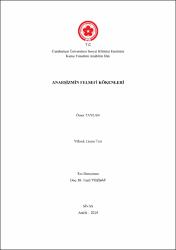| dc.contributor.advisor | Yozgat, Fazıl | |
| dc.contributor.author | Taylan, Ömer | |
| dc.date.accessioned | 2020-02-05T05:33:10Z | |
| dc.date.available | 2020-02-05T05:33:10Z | |
| dc.date.issued | 2014 | tr |
| dc.date.submitted | 2014-11-28 | |
| dc.identifier.other | ii, 127 | |
| dc.identifier.uri | https://hdl.handle.net/20.500.12418/12226 | |
| dc.description.abstract | TAYLAN, Ömer, Anarşizmin Felsefi Kökenleri, Yüksek Lisans Tezi, Sivas, 2014.
Anarşizm, her türlü otoriteye, erke, egemenliğe ve hiyerarşiye karşı olan ve bunların çözülmesi isteğini ifade eden bir ideolojidir. Bu düşünce gereği insanların, herhangi bir yöneticiye ihtiyaç duymaksızın ve bireysel özgürlüklerden fedakârlık yapmaksızın, kendi kendilerini yönetme düşüncesi içinde bulundukları yerlerde şekillenmeye başlamıştır. Modern ideolojiler gibi anarşizm de Aydınlanma Çağı’nın bir ürünü olarak ortaya çıkmış ve on dokuzuncu yüzyıl itibariyle anarşist düşünce Godwin, Max Stiner, P.J. Proudhon, Bakunin, Kropotkin’in çalışmaları sayesinde gelişme göstermiş ve sistemli bir toplumsal felsefe haline gelmiştir.
Yönetimin olmayışı ve düzensizlik anlamlarına gelen anarşi ve her türlü otoriteye, yönetime, devlet sistemlerine karşı olan anarşizm ideolojisi; “bireyi” esas alan bireyci anarşizm ile “toplumu” esas alan toplumcu anarşizm diye iki ana kola ayrılmaktadır. Bununla birlikte anarşizm, tüm otorite ve devlet biçimlerine karşı olması bağlamında diğer siyasal ideolojilerden farklılaşmaktadır. Çünkü anarşist düşünce, devletten bir şeyler yapması değil, hiçbir şey yapmaması istenmektedir. Böylelikle devletin ve siyasi otoritenin yok edilmesinden sonra kurulacak “doğal düzen” anlayışının kökeninde, insan doğasına duyulan iyimserlik vardır. İnsan doğası, potansiyel olarak iyiliğe eğilimli olduğu için, toplumsal düzen devletin ve yasaların gücüyle değil, doğal ve kendiliğinden kurulur. Böyle bir yaşam alanında özgürlüklerin alanı kendiliğinden genişlemektedir. Bununla birlikte anarşist düşünce geleneğinin tarihi kökenlerine ilk kez, yaklaşık olarak milattan önce altıncı yüzyılda, antik Çin’de yaşayan “Taoizm” denilen mistik düşünce geleneğinde rastlanır. Anarşizmin düşünsel kökenlerini, kendisine yakın büyük ideolojik akımların incelenmesiyle çıkarmak mümkündür. Bu akımlar ise rasyonalizm ile idealizmidir. | tr |
| dc.description.abstract | TAYLAN, Ömer, Philosophical Roots of Anarchism, Master Thesis, Sivas, 2014.
Anarchism is an ideology which is against authority in all its form, power, and hierarchy and which desires dissolution of all of these. In accordance with this idea, it began to take shape in the places where people have the think of governing themselves without being in need of any governor and without relinquishing personal rights. Just like modern ideologies, anarchism came into existence as a product of The Age of Enlightenment and anarchist think made progress thanks to the studies of Godwin, Max Stiner, P.J. Proudhon, Bakunin, Kropotkin by 19th century and developed into a systematic social philosophy.
Anarchy which means absence of ruler, and disorder and anarchism which is against authority in all its form, governments and state are divided into two main branches as the individualistic anarchy which is based on “individual” and social anarchism which is based on the society. However, anarchism becomes different from all other political ideologies as it is against all types of authority and state, because anarchist thinking does not want the state to do something but not to do anything. Thus, in the roots of the “natural order” which will be established after the annihilation of the authority of the state lies the optimism about the human nature. As the human nature is potentially inclined to goodness, social order is established not by the long arm of the laws but it occurs naturally and by itself. The area of freedoms gets bigger by itself in such a living space. However, historical and philosophical roots of anarchist thinking are first encountered in the mystic thinking tradition called “Taoism” which existed in ancient China around 6th century B.C.. it is possible to reveal the intellectual bases of anarchism by studying the great ideological movements that are close to it. These movements are rationalism and idealism. | tr |
| dc.language.iso | tur | tr |
| dc.publisher | Sivas Cumhuriyet Üniversitesi-Sosyal Bilimler Enstitüsü | tr |
| dc.rights | info:eu-repo/semantics/openAccess | tr |
| dc.subject | Anarşizmin Tarihsel ve Felsefi Kökenleri | tr |
| dc.subject | Anarşi | tr |
| dc.subject | Anarşizm | tr |
| dc.subject | Anarşizmin Genel İlkeleri | tr |
| dc.title | Anarşizmin Felsefi Kökenleri | tr |
| dc.type | masterThesis | tr |
| dc.contributor.department | Sosyal Bilimler Enstitüsü | tr |
| dc.relation.publicationcategory | Tez | tr |















